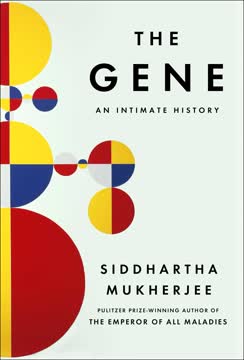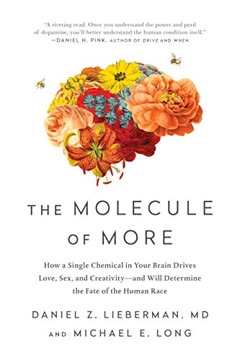Key Takeaways
1. The origin of meaning lies in natural selection
Natural selection is a poet who tries the mutations in search of a bon mot.
Natural selection creates meaning. Through the process of differential replication, natural selection preserves genetic variants that enhance survival and reproduction. This iterative process accumulates information about what has worked in past environments, imbuing genes with "meaning" in relation to organismal function and fitness. The apparently purposeful nature of biological adaptations emerges from this blind, algorithmic process.
Chance and necessity interplay. Random genetic mutations provide the raw material for evolutionary change, but it is the non-random process of selection that shapes meaningful adaptations. This interplay resolves the seeming paradox of how directionless physical processes can generate complex, apparently designed organisms.
- Key components of meaning-generation through natural selection:
- Heritable variation in traits
- Differential reproduction based on those traits
- Accumulation of adaptive information over generations
2. Genes are both agents and texts in the evolutionary process
Genes are specifications of souls. They provide information for building an interpreter that decides for itself.
Genes as dual entities. Genes function both as material causes in development and as repositories of evolutionary information. As physical entities, genes participate in cellular processes. As informational entities, they embody a historical record of what has worked in past environments.
Strategic genes. The concept of "strategic genes" bridges the material and informational aspects. These are collections of gene copies that act together to influence their own transmission to future generations. This perspective helps resolve debates about units of selection in evolution.
- Aspects of genes:
- Material: DNA molecules in cells
- Informational: Carriers of heritable adaptive information
- Strategic: Collections of copies acting to enhance their own replication
3. Organisms are interpreters of genetic and environmental information
Life is interpretation.
Organisms as meaning-makers. Living beings are not passive vehicles for genes but active interpreters of both genetic and environmental information. This interpretive capacity allows organisms to respond flexibly to their environments, enhancing survival and reproduction.
Levels of interpretation. Interpretation occurs at multiple levels, from molecular interactions to complex cognitive processes. Simple molecular "devices" like riboswitches interpret cellular conditions, while sophisticated neural networks in animals interpret complex environmental cues.
- Examples of biological interpretation:
- Riboswitches responding to metabolite concentrations
- Immune systems distinguishing self from non-self
- Animal brains processing sensory information
- Human cultural interpretation of symbols and language
4. Internal genetic conflicts shape organismal development and behavior
We are not slaves to our genes, because they have delegated decision making to our souls.
Genomic conflict. Different genes within an organism can have conflicting evolutionary interests, particularly those inherited from mothers versus fathers (genomic imprinting). These conflicts can influence development, physiology, and behavior in subtle ways.
Implications for understanding organisms. Recognizing internal genetic conflicts challenges simplistic views of organisms as perfectly integrated units. It provides new perspectives on phenomena like parent-offspring conflict, sexual dimorphism, and even human psychological tendencies.
- Examples of genomic conflict:
- Paternal genes promoting fetal growth vs. maternal genes limiting it
- Conflicts over resource allocation among siblings
- Potential influence on human cognitive and behavioral traits
5. Cultural evolution parallels biological evolution through memes
Ideas are communally generated, and this book was no exception.
Memes as cultural replicators. Ideas, behaviors, and cultural practices can be viewed as "memes" that evolve through processes analogous to biological evolution. Memes replicate, vary, and undergo selection based on their ability to spread and persist in human minds and cultures.
Interactions between genetic and memetic evolution. While memes evolve much faster than genes, there are complex interactions between biological and cultural evolution. Human cognitive capacities shaped by genetic evolution influence the types of memes that can spread, while cultural practices can create new selective pressures on genes.
- Key features of memetic evolution:
- Replication through imitation and learning
- Variation through innovation and misunderstanding
- Selection based on psychological appeal and cultural fit
- Accumulation of cultural adaptations over time
6. Understanding life requires both mechanistic and teleological explanations
Teleology is a lady without whom no biologist can live. Yet he is ashamed to show himself with her in public.
Bridging mechanism and purpose. While modern biology emphasizes mechanistic explanations, understanding life fully requires considering both how organisms work (mechanism) and why they have evolved certain features (function or purpose). This dual perspective integrates proximate and ultimate explanations.
Naturalized teleology. The apparent purposefulness of biological adaptations can be understood as the result of natural selection, without invoking supernatural design. This perspective allows biologists to use teleological language judiciously, recognizing it as a useful shorthand for evolutionary processes.
- Complementary explanatory modes:
- Mechanistic: How do organisms work?
- Functional: What is the adaptive significance of a trait?
- Historical: How did this trait evolve over time?
7. Human agency emerges from the interplay of genes, environment, and culture
We are cultural conformists and cultural skeptics by human nature. We are freed from genetic determinism by culture and individual choice. We are freed from cultural determinism by human nature.
Multilayered determinants of human behavior. Human agency arises from the complex interactions of genetic predispositions, environmental influences, cultural learning, and individual choice. This perspective avoids both genetic and cultural determinism.
Emergent freedom. While human behavior is influenced by multiple factors, the complexity of these interactions creates space for meaningful individual agency. Our capacity for self-reflection and cultural innovation allows us to partially transcend our biological and cultural constraints.
- Factors shaping human agency:
- Genetic predispositions
- Environmental influences
- Cultural learning and norms
- Individual reasoning and choice
- Feedback between levels (e.g., culture influencing gene expression)
8. Meaning and purpose in biology are grounded in evolutionary history
The meanings of life bear the trace of what they are not.
Historical contingency of meaning. The meanings we find in biological systems are products of their evolutionary history. Features that appear purposeful or meaningful exist because of past selection pressures, not because of inherent cosmic significance.
Open-ended creativity of evolution. While evolution is constrained by history and physical laws, it has produced an astounding diversity of life forms and adaptations. This creative potential of evolutionary processes continues to generate new meanings and purposes in the living world.
- Implications of evolutionary meaning:
- Appreciation for the contingent nature of biological features
- Recognition of shared evolutionary heritage across life
- Potential for continued evolutionary innovation
- Humility regarding human-centric interpretations of nature's "purposes"
Last updated:
FAQ
What's From Darwin to Derrida about?
- Exploration of Meaning: The book examines how meaning is created and interpreted, blending philosophy and science to explore this concept.
- Interdisciplinary Approach: David Haig integrates evolutionary biology, philosophy, and literary theory, fostering a dialogue between these fields.
- Genes and Culture: It discusses the role of genes in shaping behavior and culture, suggesting an interconnected evolution of both.
Why should I read From Darwin to Derrida?
- Unique Perspective: Offers a fresh view on the relationship between natural selection and meaning, challenging traditional disciplinary boundaries.
- Engaging Writing Style: Haig's accessible and thought-provoking writing makes complex ideas understandable for a broad audience.
- Relevance to Current Issues: The discussions on genes, culture, and meaning are pertinent to contemporary debates in science and philosophy.
What are the key takeaways of From Darwin to Derrida?
- Science and Humanities Interconnectedness: Insights from biology can enrich literature and philosophy, and vice versa.
- Selfish Genes Concept: Genes act to promote their own replication, influencing behavior and culture.
- Evolution of Meaning: Meaning evolves through cultural and biological processes, shaped by historical contexts.
How does David Haig define meaning in From Darwin to Derrida?
- Meaning as Output: Meaning is the result of an interpretive process, not an inherent property of information.
- Interpretive Mechanisms: Interpreters connect observations to actions, with context shaping meaning.
- Avoiding Semantic Problems: This redefinition simplifies complex semantic issues like polysemy.
What is the concept of "selfish genes" in From Darwin to Derrida?
- Definition of Selfish Genes: Genes promote their own replication, sometimes at the organism's expense.
- Strategic Behavior: Genes act as strategists, enhancing their chances of being passed on.
- Cultural Implications: This concept extends to cultural evolution, viewing ideas and behaviors through replication and survival.
How does From Darwin to Derrida connect genes and culture?
- Cultural Evolution: Cultural traits evolve similarly to genetic traits, undergoing selection and replication.
- Memes as Cultural Genes: Introduces "memes," cultural units that replicate and evolve like genes.
- Biology and Culture Interplay: Understanding human behavior requires considering both genetic and cultural influences.
How does Haig address the concept of teleology in From Darwin to Derrida?
- Rejection of Traditional Teleology: Purpose arises from natural selection, not divine design.
- Naturalized Teleology: Proposes understanding organism purposes through evolutionary processes.
- Implications for Meaning: Suggests meaning and purpose emerge from evolutionary history, not preordination.
What role does conflict play in the discussion of genes in From Darwin to Derrida?
- Intrapersonal Conflict: Genes can have conflicting interests within an individual, affecting behavior.
- Maternal vs. Paternal Genes: Highlights differing agendas of maternal and paternal genes in offspring.
- Evolutionary Consequences: These conflicts shape trait expression and organism-environment interactions.
How does From Darwin to Derrida redefine the concept of phenotype?
- Phenotype as Effects: Emphasizes that phenotypic effects are context-dependent and vary across environments.
- Comparison-Based Definition: Phenotype is understood through comparisons with alternatives.
- Dynamic Nature of Phenotypes: Shaped by genetic and environmental interactions over time.
How does Haig relate evolutionary theory to human psychology in From Darwin to Derrida?
- Evolutionary Psychology Framework: Uses evolutionary biology to explain psychological phenomena.
- Conflict and Cooperation: Evolutionary pressures lead to both conflict and cooperation within individuals.
- Cultural Evolution: Considers how cultural factors interact with genetic influences, shaping psychological outcomes.
What is the significance of the "internal politics of the self" concept in From Darwin to Derrida?
- Metaphor for Decision-Making: Illustrates complex negotiation processes within individuals.
- Understanding Conflict: Provides a framework for understanding internal struggles in decision-making.
- Implications for Self-Control: Suggests self-control involves managing competing interests within the self.
How does From Darwin to Derrida challenge traditional views of human behavior?
- Complex Interplay of Influences: Emphasizes the interplay between genetics and environment.
- Rejection of Genetic Determinism: Argues against simplistic genetic determinism, highlighting cultural and experiential influences.
- Focus on Internal Conflict: Provides a framework for understanding behavior beyond traditional psychological models.
Review Summary
From Darwin to Derrida explores the intersection of evolutionary biology and philosophy, offering thought-provoking insights on genetics, meaning, and interpretation. Readers praised its ambitious scope and intellectual depth, but some found it challenging due to dense writing and complex concepts. The book draws connections between genes, information, and human experience, expanding on ideas from Dawkins and Dennett. While some reviewers appreciated the novel perspectives, others felt it didn't fully deliver on its promise to bridge Darwin and Derrida. Overall, it's considered a valuable contribution for those with a background in biology and philosophy.
Similar Books








Download PDF
Download EPUB
.epub digital book format is ideal for reading ebooks on phones, tablets, and e-readers.




